

Culture. Civic-engagement. Diversity. Twitter. Open-video. Online Social Networks Bridge Gaps for Chronically Ill. El pasado, presente y futuro animado de Wikipedia en ALT1040 (Diseño) Text Patterns: Particularize. Q&A: A West Point for Community Organizing - Walking Distance. Since its first boot camp in 2006 the New Organizing Institute has trained more than 700 organizers across the country in leveraging online tools to generate offline action.
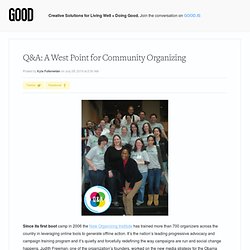
It’s the nation’s leading progressive advocacy and campaign training program and it’s quietly and forcefully redefining the way campaigns are run and social change happens. Judith Freeman, one of the organization’s founders, worked on the new media strategy for the Obama campaign and is using those same tactics to train leaders from organizations like the NAACP and the Red Cross. We spoke to Ms. Freeman about what community organizing looks like in the 21st century. FAILFaire: Sharing and Learning from Failures with a Sense of Humor. My video-game forum fosters real political discussion. No, really. : This Magazine // Canadian progressive politics, environment, art, culture // Subscribe today. Online communities bring together people who would never talk in real life.
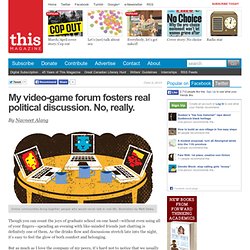
Illustration by Matt Daley. Though you can count the joys of graduate school on one hand—without even using all of your fingers—spending an evening with like-minded friends just chatting is definitely one of them. As the drinks flow and discussions stretch late into the night, it’s easy to feel the glow of both comfort and belonging. But as much as I love the company of my peers, it’s hard not to notice that we usually talk about the same things in the same way. FRONTLINE: digital nation: watch the full program.
I wanted to wait a bit because it seemed like it'd be more interesting to listen to all of you.
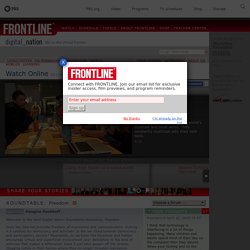
There used to be a name for what I was doing, "lurking" -- it dates back to a very different time in the net's history, when usenet and mailing lists were the main forms of communication. It was hard to talk about lurkers then, for the obvious reason that no one knew much about them; it hasn't gotten much easier since.
Online Social Networks Bridge Gaps for Chronically Ill. Radical Inclusion. Montreal’s MP3 experiment. UPDATE: Read about how this event went.
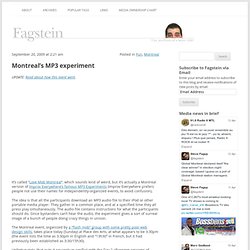
It’s called “Love Mob Montreal“, which sounds kind of weird, but it’s actually a Montreal version of Improv Everywhere’s famous MP3 Experiments (Improv Everywhere prefers people not use their names for independently-organized events, to avoid confusion). The idea is that all the participants download an MP3 audio file to their iPod or other portable media player. They gather in a common place, and at a specified time they all press play simultaneously.
The audio file contains instructions for what the participants should do. Since bystanders can’t hear the audio, the experiment gives a sort of surreal image of a bunch of people doing crazy things in unison. Today's cultish interactivity is a poor substitute for a proper public sphere. When historians draw a line around the first decade of this century, they will measure the traffic in text messages, wade through the "have your say" sections on online newspapers, and count the membership of social networking sites – and they will surely conclude that this has been the dawning of the age of interactivity.
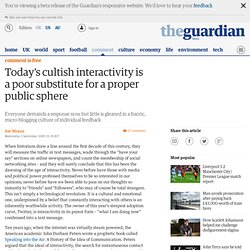
Never before have those with media and political power professed themselves to be so interested in our opinions; never before have we been able to pass on our thoughts so instantly to "friends" and "followers", who may of course be total strangers. This isn't simply a technological revolution. The brave new world of slacktivism. Last week, The Globe and Mail ran an article on the history of “slacktivism” (the G&M piece seems to have grown out of an interview I did with CBC's Spark a few weeks ago on the same subject).

"Slacktivism" is an apt term to describe feel-good online activism that has zero political or social impact. It gives those who participate in "slacktivist" campaigns an illusion of having a meaningful impact on the world without demanding anything more than joining a Facebook group. Digital Revolution Blog: Internet freedom and Digital Revolution? Grow up. Study: Americans driven online for help during recession - Ars Technica. A large majority of Americans have used the Internet to seek advice or help during the current recession, according to a new report by the Pew Internet and American Life Project.

Whether it's to find out what went wrong with the economy, look for new jobs, save money, sell personal items, or apply for loans, 69 percent of all Americans (88 percent of adult Internet users) now fall into the category of "online economic users," with Pew noting that these people are making sure to be extra-networked in order to get through the downturn. According to Pew, 52 percent of Americans have been hit by economic troubles of some kind. Wp_content/clever_wordpress_headline.php. WordPress co-founder Matt Mullenweg (left) with Q&A moderator Jeremy Clarke at WordCamp.
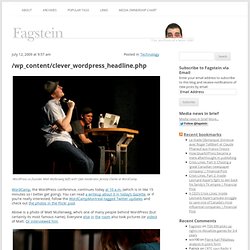
WordCamp, the WordPress conference, continues today at 10 a.m. (which is in like 15 minutes so I better get going).